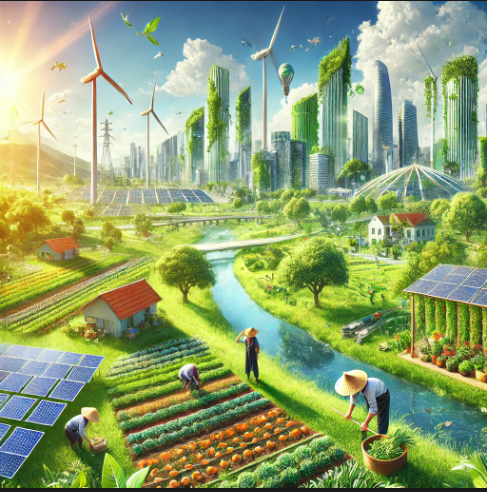Sustainability has become one of the most pressing issues of the 21st century, as it encompasses the practices and processes aimed at preserving the ecological balance of our planet while ensuring the wellbeing of current and future generations. Rooted in the idea that humanity's demands on natural resources should not exceed the Earth’s capacity to regenerate them, sustainability covers economic, social, and environmental dimensions. It addresses a wide spectrum of global challenges, including climate change, environmental degradation, and social inequities.
At the heart of sustainability is the recognition that human activities are placing unsustainable pressure on the planet’s ecosystems. This pressure stems from industrialization, deforestation, pollution, overconsumption of natural resources, and the extensive use of fossil fuels. The consequences are already being felt through the loss of biodiversity, rising sea levels, increased greenhouse gas emissions, and extreme weather patterns. To counter these effects, sustainability seeks to promote the responsible use of resources, innovative technological solutions, and policies that align human development with environmental preservation.
A key concept of sustainability is the "triple bottom line," which emphasizes the balance between economic growth, environmental stewardship, and social wellbeing. This approach encourages businesses, governments, and individuals to evaluate success not only by financial profit but also by the positive impacts on society and the planet. For example, companies that adopt sustainable practices may focus on reducing their carbon footprint, minimizing waste, and supporting local communities. The integration of sustainability into business models has led to the rise of corporate social responsibility (CSR), where businesses actively work to contribute to the common good.
Another significant aspect of sustainability is the shift toward renewable energy sources. Fossil fuels, which currently dominate global energy systems, are finite and heavily contribute to pollution and climate change. Transitioning to renewable energy options, such as solar, wind, and hydropower, is not only essential for reducing carbon emissions but also for fostering energy independence and long-term economic resilience. In addition, energy-efficient technologies and green building practices help reduce the consumption of non-renewable resources while improving quality of life.
In agriculture, sustainable practices aim to meet growing food demands without degrading the soil, water, or biodiversity. Organic farming, regenerative agriculture, and agroforestry are examples of sustainable agricultural systems that seek to improve soil health, reduce chemical inputs, and increase biodiversity. These methods are key to addressing food security while minimizing environmental impacts. Similarly, sustainable fisheries and forest management practices are vital for maintaining the health of ecosystems that provide essential services to both nature and people.
On a societal level, sustainability is closely tied to social justice and equity. It acknowledges that marginalized and vulnerable communities often bear the brunt of environmental degradation, climate change, and economic exploitation. Sustainable development seeks to empower these communities by ensuring access to clean water, education, healthcare, and employment opportunities, ultimately creating a more just and equitable world.
In conclusion, sustainability is a multifaceted approach that requires a fundamental shift in how humanity interacts with the environment, the economy, and society. By fostering innovation, embracing renewable energy, and promoting sustainable practices across all sectors, humanity can chart a course toward a future where prosperity does not come at the expense of the planet’s health or social equity. Sustainability is not merely a trend, but a critical pathway for creating a balanced, resilient, and just world for generations to come.

